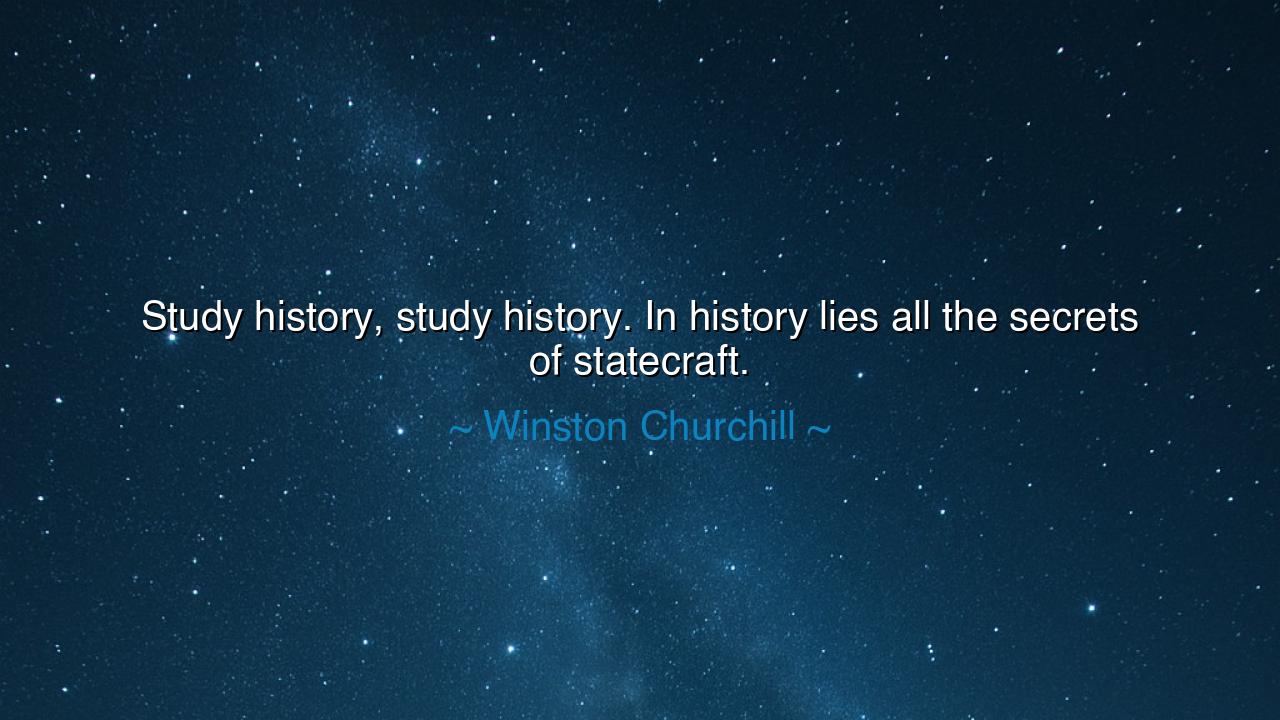
Study history, study history. In history lies all the secrets of






“Study history, study history. In history lies all the secrets of statecraft.” Thus spoke Winston Churchill, the lion of Britain, whose wisdom was born from the furnace of war and the long study of human destiny. These words, simple yet thunderous, are not a mere counsel for scholars but a command for all who would wield power or seek to guide others. For Churchill knew, as few men ever have, that the key to governing nations and understanding mankind lies not in novelty, but in remembrance — that the patterns of the present are but echoes of the past, and that the wise ruler must listen for those echoes if he is to steer his people safely through the storms of history.
The origin of this quote lies in Churchill’s lifelong reverence for the lessons of the past. Before he was the wartime Prime Minister who defied tyranny, he was a historian and biographer, the author of vast works such as The World Crisis and A History of the English-Speaking Peoples. He believed that history is the map of human nature, drawn in the blood, hope, and folly of generations. When he urged, “Study history,” it was not idle advice — it was the foundation of his philosophy of leadership. To him, statecraft, the art of governing wisely, was inseparable from historical memory. For how can a man lead a people if he does not understand what has led them to this moment?
Churchill’s own life was proof of his creed. When the fires of World War II engulfed Europe, he stood as the last bulwark against tyranny. He had read the chronicles of fallen empires, of Rome’s decay and Athens’ arrogance, of the folly that follows complacency. Thus, when others counseled appeasement, he saw the shadow of Munich not as peace, but as prelude to ruin. He had studied the lessons of Napoleon, who once rose from the ashes of revolution to threaten the world, and he knew that unchecked ambition, once fed, becomes insatiable. It was this vision — this historical insight — that gave him the courage to stand firm when all seemed lost. For he had learned, through history, that victory belongs not to the timid, but to those who understand the tides of time.
And yet, Churchill’s words speak not only to rulers, but to all who wish to live with wisdom. For history is the great teacher of souls. It shows us that human nature — with its passions, its pride, its thirst for glory and fear of loss — changes little, though centuries may pass. The names of kings and nations alter, but the forces that move them remain the same. Every age believes itself unique, yet in the annals of history one finds its reflection already lived and written. The wise learn humility from this truth: that every triumph and every tragedy we witness has been played before upon the stage of time.
Consider the fate of the Roman Republic, which once stood as a beacon of law and order, only to fall into tyranny through the greed and ambition of its leaders. The men of that age — Caesar, Pompey, Crassus — sought power not for the state, but for themselves, and in doing so destroyed the liberty they claimed to defend. Churchill, like many before him, saw in Rome’s fall the eternal warning: that democracy must be guarded not only by armies, but by virtue, by memory, and by the vigilance of citizens who remember how easily freedom decays. To study history is to see these patterns, to recognize the seeds of decay before they bloom, and to avert catastrophe before it comes.
But those who neglect history — those who see only the present — walk as blind men upon a battlefield, unaware of the dangers that surround them. Without memory, nations repeat their errors; without wisdom, leaders mistake ambition for vision. As Churchill himself once said elsewhere, “Those that fail to learn from history are doomed to repeat it.” To study history, then, is to sharpen the mind, to discipline the judgment, and to anchor the soul. It is the medicine against arrogance, the armor against ignorance, the light that reveals the paths of both ruin and redemption.
So, my children, heed the command of the elder statesman: study history. Read the chronicles of those who came before you — not merely to know their deeds, but to feel their struggles, to understand their hearts. Learn from their mistakes, cherish their wisdom, and see in their stories the mirror of your own. For the secrets of power, of peace, and of purpose lie not in the inventions of today, but in the remembrance of yesterday.
And remember this final truth: history is not dead; it lives within you. Every act you take, every decision you make, becomes another line in the eternal book of mankind. Study the past, that you may write the future with courage, humility, and vision. For in the great scroll of time, those who understand history do not merely survive it — they shape it.






AAdministratorAdministrator
Welcome, honored guests. Please leave a comment, we will respond soon